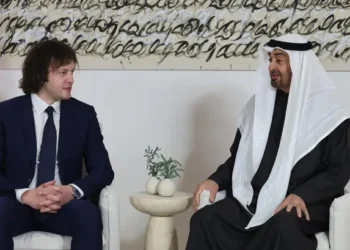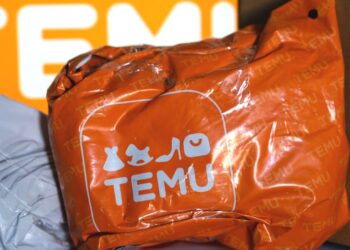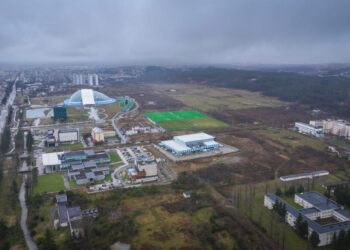Dr. Oliver Patsch, Chief Executive Officer at HeidelbergCement Georgia, has been involved in the building materials industry for over 20 years.
HeidelbergCement is one of the world’s largest building materials companies. The core activities of HeidelbergCement include the production and distribution of cement and aggregates, the two essential raw materials for concrete. Their downstream activities include the production of ready-mixed concrete, but also other building products in other countries.
HeidelbergCement has been active in Georgia since 2006 and is a leader on the local cement market. The company operates three cement plants in Kaspi (1) and Rustavi (2), a cement grinding mill in Poti, a cement terminal in Supsa, and is the only clinker producer in Georgia.
“I started my career at Holcim, one of the big competitors, and then, almost 10 years ago, I moved to HeidelbergCement and started working at HeidelbergCement Group prior to becoming GM in Georgia in July 2020,” Dr. Oliver Patsch tells GEORGIA TODAY in an exclusive interview.
The first concrete batching plant was put into operation in 2009, and currently the company operates 15 concrete batching plants. HeidelbergCement Georgia supplies cement and concrete to almost every major construction project. Modern technologies and sustainability are the two main directions of the company’s activities.
“This year is special for HeidelbergCement, as our company turned 15 years old,” Patsch tells us.
“The most important and valuable achievement for us during all these years is our customers’ high trust and satisfaction in our company.
“Over all these years, the company has remained the market leader in its field of operation, and of course, this success is conditioned by a mix of good leadership, motivation- which ends up in the production of high quality products –the offering of good service to our customers, and the professionalism of our employees. This combination leads to customer satisfaction and we’re very happy and proud due to the fact that HeidelbergCement always remains a loyal and trustworthy partner to them.
“We’re very lucky to have a young, yet experienced team here in Georgia, who significantly contribute to the company’s successful operation in the local market,” Patsch says.
One of the most important elements for success is also continuous investments, he notes.
“When aiming to produce high quality cement, you need good and modern equipment, that’s why we continue to actively invest in all our facilities across the country.”
The company invested €100 million in 2019 to modernize the Kaspi plant and build a new clinker production line.
During their 15 years in operation, among the most important achievements and projects implemented by HeidelbergCement Georgia, Patsch tells us, is the recent modernization of the Kaspi plant, a big and important project.
“The project was very successful, it was completed on time, and we had no accidents while rebuilding it.”
Along with implementing important and large-scale projects, HeidelbergCement actively cares about making investments and generating employment, and these will remain key directions of its activities in the future.
“HeidelbergCement has invested more than $400 million in Georgia, it currently employs 1200 people and operates three cement and 15 concrete plants. However, we aren’t going to stop and are planning on further expanding our scales of production, which itself will contribute to the employment of locals and the development of economic conditions in general.
“We’re constantly focused on development, and I don’t see us as purely a cement company. We’re a building materials company. We have now three aggregates plants, we’re building a new concrete plant in Tbilisi, and so, the development continues!”
From the point of CSR and environment care, important in the process of production is the use of alternative fuels, the Georgia GM tells us. It is a little-known field in Georgia as yet.
“When you have a lot of waste products, tires, for example, these things are thrown away in the wild, in landfills. The government is working to observe more sanitary norms, however, it’s still landfilling on the ground. What we can do is to utilize the waste in our plant, make a fuel, totally free of negative compounds as a result of appropriate processing, which can be used in a very environmental-friendly way. Of course, producing alternative fuels will be also quite beneficial for the local economy, so we’re planning to actively develop this eco-friendly direction here in Georgia.
He notes the biggest challenge the company had to face during these years was the coronavirus pandemic. However, their crisis management strategy was focused on maximally observing sanitary and hygiene norms and expanded testing to contain that situation.
“So, we managed to overcome this challenge well, despite certain difficulties in operation which still remain, such as increased costs, etc. From the economic perspective, regarding the demand on our products, I would say there have been changes in various sectors of customers, however, the demand as a whole remains quite stable. So that’s not an issue. The biggest issue and challenge that actually hit us was the GEL exchange rate. This also comes indirectly from the COVID crisis and puts pressure on the national currency, the Lari. And the country is still importing more than it exports. So, I’m a big supporter of Georgia’s greater independence in using its natural resources. I believe the country needs to be self-sufficient in electricity, and it has a great potential to use its green resources with minimum damage to the nature.
“From the investors’ perspective, I’d say Georgia is a fantastic country to invest in, considering the ease of doing business and positive and convenient environment in general. However, in certain areas, a stronger and stricter legislation is necessary. We, as a foreign company, of course, want to strictly follow all the rules. Also, we and all the foreign companies sometimes need a little bit more support and promotion from the state.”
Interview by Ana Dumbadze















